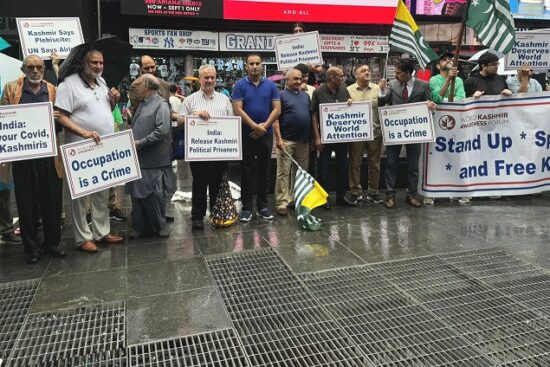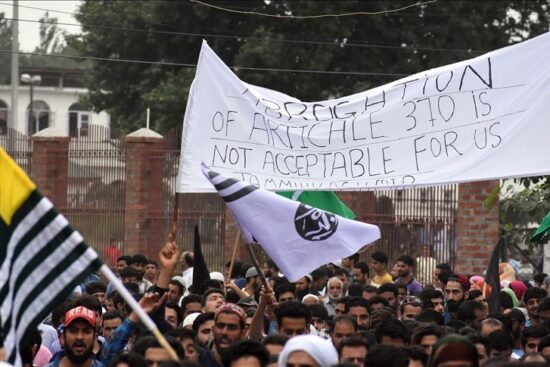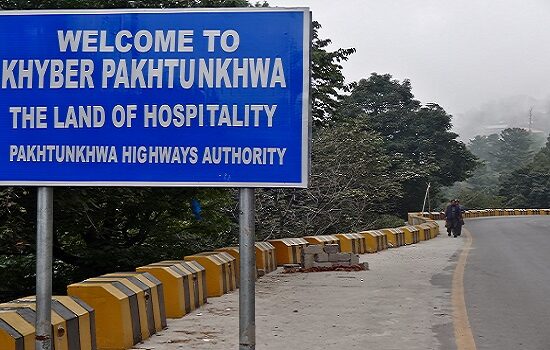
On August 5, 2019, the Indian Government made a controversial decision to revoke Article 370 and 35 A of the Indian Constitution, which granted special autonomy to the region of IIOJK while forbidding outsiders from permanently settling, buying land, holding local government jobs or winning education scholarships in the region respectively. This decision was accompanied by a bifurcation of the state into two Union Territories: Jammu and Kashmir, and Ladakh. As the fifth anniversary of this event approaches, it remains essential to reflect on its profound implications, particularly regarding the silencing of Kashmiri leaders who have long advocated for the region’s right to self-determination.
The Roots of Article 370 and 35 A and its Revocation
Article 370 was incorporated into the Indian Constitution in 1949, following the accession of the princely state of Jammu and Kashmir to India. This Article was designed to grant significant autonomy to the state, allowing it to have its constitution and a separate set of laws, except in matters of defense, foreign affairs, finance, and communications. This autonomy was intended as a temporary provision until a plebiscite could determine the region’s future—a promise that still remains unfulfilled. Article 35A, introduced through a Presidential Order in 1954 under Article 370, allowed the local legislature in IIOJK to define “permanent residents.” It barred non-residents from settling, buying land, holding government jobs, or receiving educational scholarships in the region. It also restricted property rights for women who married non-residents, affecting their children’s rights as well. This action has sparked concerns about potential demographic changes, as it allows non-residents to settle, buy land, and secure government jobs in the region.
The revocation of Articles 370 and 35 A was a highly contentious move, implemented through a Presidential Order and subsequent parliamentary vote. The Indian government, led by the Hindutva-driven Bharatiya Janata Party (BJP), justified the action by arguing that it would lead to greater integration of IIOJK with India, stimulate economic development, and curb terrorism.
The Immediate Fallout
In the wake of the revocation of Article 370 and 35 A, the Indian government imposed a stringent lockdown in Indian Illegally Occupied Jammu and Kashmir (IIOJK), including curfews, communication blackouts, and the detention of thousands of political leaders, activists, and ordinary citizens. Prominent Kashmiri leaders, including three former Chief Ministers—Farooq Abdullah, Omar Abdullah, and Mehbooba Mufti—were placed under house arrest or detained under the Public Safety Act, a law that allows for detention without trial for up to two years. Even before the revocation,the entire Hurriyat political leadership – the genuine voice of the Kashmiris — has been detained for the past several years. Numerous Kashmiri leaders, including Syed Ali Geelani, have died in custody. The sham trial of the renowned Kashmiri political leader, Yaseen Malik, is illustrative of the callous suppression in the area.
These measures were justified by the Indian government as necessary to prevent unrest and violence. However, they were widely condemned by international human rights organizations, who argued that they constituted a severe violation of civil liberties and an attempt to stifle political dissent.
The Long-Term Impact
Over the past five years, the political landscape in IIOJK has undergone a dramatic transformation. The traditional political parties that once dominated the region, such as the Indian Illegally Occupied Jammu and Kashmir (IIOJK) National Conference (NC) and the Indian Illegally Occupied Jammu and Kashmir (IIOJK) Peoples Democratic Party (PDP), have been marginalized. Many of their leaders remain under scrutiny, and political activity is heavily regulated.
The abrogation of Article 370 and 35 A and the subsequent reorganization of the state have also led to significant demographic and administrative changes. The new domicile law, which allows non-residents to acquire property and settle in IIOJK, has sparked fears of demographic change aimed at altering the region’s Muslim-majority character. Furthermore, the reorganization has centralized power in the hands of the Union government, reducing local representation and governance.
A Struggle for Self-Determination
The Kashmiri leadership’s advocacy for self-determination has been a contentious issue since the region acceded to India. The right to self-determination, enshrined in various international conventions, including the United Nations Charter, is the principle that people should have the right to freely choose their sovereignty and international political status.
In the case of IIOJK, this right has been a central demand of various Kashmiri political and nationalist groups. However, successive Indian governments have resisted any move towards a plebiscite or meaningful dialogue on the issue, citing concerns over national sovereignty and security.
The revocation of Article 370 and 35 A and the subsequent crackdown on political dissent have exacerbated this situation. By silencing Kashmiri leaders and curtailing political freedoms, the Indian government has effectively stifled the discourse on self-determination. The heavy-handed approach has also fueled resentment and alienation among the Kashmiri populace, leading to increased radicalization and cycles of violence, evidenced by the recent surge in attacks on the Indian Army in IIOJK. At least 18 attacks have been made by the Kashmiri freedom fighters in the past 3 months alone.
International Response
The international response to the situation in IIOJK has been mixed. While some countries and international organizations have expressed concern over human rights violations and called for dialogue, others have remained largely silent, influenced by geopolitical considerations and strategic partnerships with India.
The United Nations has repeatedly called for the resolution of the Kashmir issue through peaceful means and respect for human rights. However, tangible international intervention has been limited, partly due to India’s position as a significant global player and its diplomatic influence.
A Call for Reflection and Action
The revocation of Article 370 and 35 A and the subsequent silencing of Kashmiri voices highlight the complex and contested nature of the Kashmir issue. As the region marks the 5th anniversary, all stakeholders must reflect on the need for a just and peaceful resolution that respects the rights and aspirations of the Kashmiri people.
The path forward lies in dialogue, respect for human rights, and the recognition of the legitimate aspirations of the people of IIOJK. Only through such measures can a sustainable and peaceful resolution to this long-standing conflict be achieved.



















Comments (1)
binance referal codesays:
October 4, 2024 at 3:57 amCan you be more specific about the content of your article? After reading it, I still have some doubts. Hope you can help me.